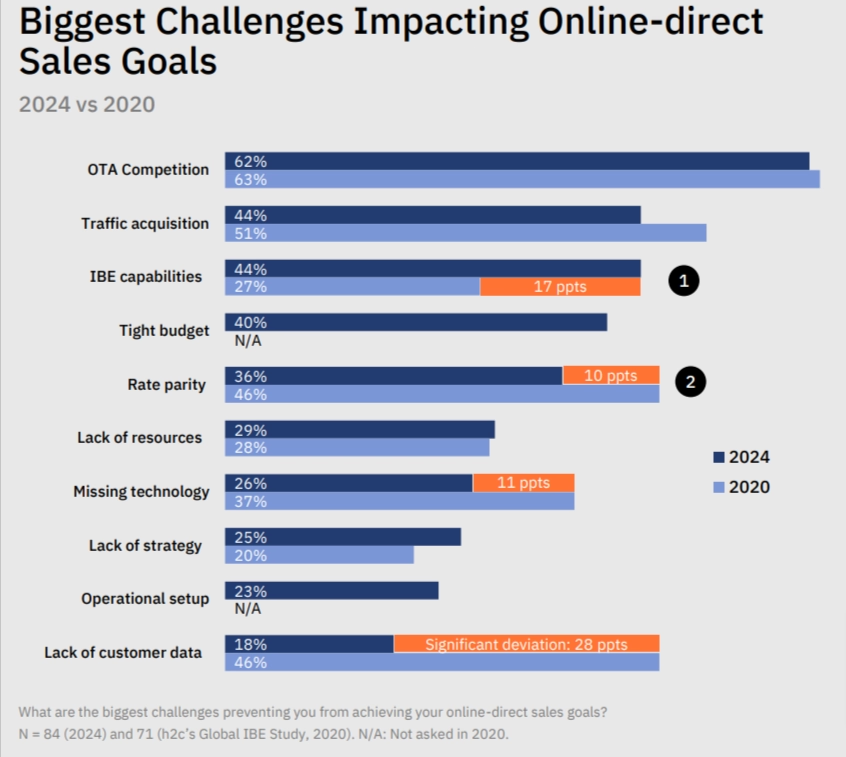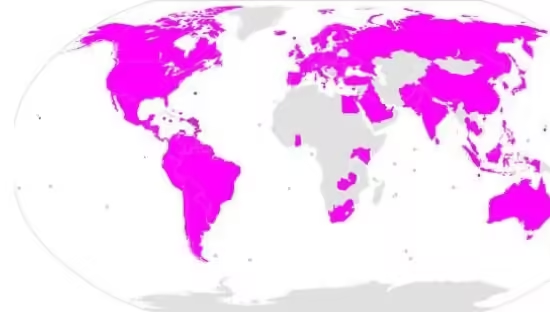
Direct Booking Potential: How Hotels Are Leveraging Mobile, Loyalty, and AI to Boost Revenue
The hospitality industry has been witnessing significant changes in the digital landscape, impacting how hotels attract and manage bookings. As h2c’s “Direct Booking Acceleration” study shows, hotels are striving to balance direct bookings and OTA partnerships to boost revenue, retain customer loyalty, and refine user experience.
Here’s an exploration of the study’s main findings, revealing trends, challenges, and advancements in hotel direct booking practices.
Growth and Potential of Direct Bookings
After the surge in 2022 due to the post-pandemic travel rebound, direct booking growth has normalized yet remains promising. Hotels are increasingly shifting their booking strategies towards online direct channels, with steady improvements in IBE (Internet Booking Engine) functionalities to cater to guest demands for a more personalized and seamless experience. The growth trajectory is currently moderate but aligns with broader digital transformations in hospitality.
- Mobile Dominance: Mobile bookings are becoming crucial, with mobile website sales projected to make up nearly half of IBE sales within the next 2-3 years. Large hotel chains, especially those with loyalty programs, also lead in app-based revenue. This trend signals an industry shift from desktop to mobile, emphasizing the importance of optimizing websites and apps for mobile devices.
Technological Advancements: AI and Automation in Focus
AI’s role in direct bookings is growing, with hotels leveraging AI for yield management, personalization, content creation, and chatbots. AI-driven personalization can cater to guests’ unique preferences, enhancing their booking journey and experience. The study reveals that almost half of the surveyed chains are adopting or planning to adopt AI for personalized offers and yield management.
Automation is also becoming essential for hotels seeking efficiency. However, despite its potential, about 43% of chains lack dedicated teams to identify automation opportunities, leaving room for operational improvements.
Loyalty Programs: Driving Direct Sales but Falling Short on Revenue
While nearly half of the hotel chains offer loyalty programs, these programs account for less than a third of their revenue on average. Larger U.S.-based chains contribute significantly more revenue through loyalty programs compared to smaller, independent hotels. Common loyalty benefits include lower member rates, points-based rewards, and, less frequently, vouchers and subscription models.
Hotels have a unique opportunity to optimize loyalty programs by integrating more personalized offers and benefits tailored to frequent travelers, especially as customer expectations for rewards are evolving in today’s market.
Overcoming Barriers: Challenges in Online-Direct Sales
Despite advancements, hotels face several challenges in boosting direct sales. Major barriers include competition from OTAs, traffic acquisition costs, and rate parity issues. The study notes that while large chains have overcome some limitations, small chains still struggle with gaps in booking engine functionality, reporting tools, and multi-property capabilities. OTA competition remains the top barrier to direct sales, indicating that hotels need effective strategies to balance OTA partnerships with direct bookings.
- IBE Pain Points: Although personalization and customization have improved since 2020, challenges in upselling, rate strategies, and reporting are now more pronounced. Enhanced IBE capabilities remain essential, especially for small chains, as they attempt to capture a larger share of direct bookings.
Ancillary and Item Sales: A Growing Revenue Stream
Ancillary and item sales (products or services sold independently from room bookings) represent an untapped revenue opportunity, with hotels recognizing the potential to generate additional income through offerings like breakfast packages, room upgrades, and transportation services. Large chains report a notable gap between potential and actual revenue from ancillary sales, emphasizing the need to better capitalize on this opportunity. The survey highlights that only a quarter of the IBEs currently offer item sales functionality, but interest in implementing this feature is strong.
Key Drivers for Technology Adoption in Hotels
As technology continues to transform the industry, hotels prioritize cost-effective solutions, seamless integrations, and innovative functionalities. Smooth integration with open APIs is crucial, particularly as hotels strive to consolidate guest data across PMS, POS, and CRM systems to offer a cohesive experience. Support and consulting services remain vital, with 68% of respondents citing them as necessary for new technology acquisitions.
Future Innovations: The Role of AI, Local Experiences, and Process Optimization
Looking ahead, h2c’s study identifies AI, local experience bookings, and creativity-focused chatbots as top innovation areas for hotels. AI-driven recommendation engines, chatbots with booking capabilities, and automation in marketing and operations will be key in enhancing guest engagement. Moreover, hotels are exploring direct booking options for local experiences, such as restaurant discounts and local event access, providing guests with valuable and context-specific offers that elevate their stay.
Conclusion
h2c’s “Direct Booking Acceleration” study reflects the hotel industry’s growing focus on mobile optimization, personalization, loyalty, and AI in response to shifting guest preferences and competitive pressures from OTAs. By adopting innovative technologies and fine-tuning direct booking strategies, hotels can not only enhance guest satisfaction but also capture more direct sales, paving the way for a future where the balance between OTA reliance and direct bookings is more favorable.











